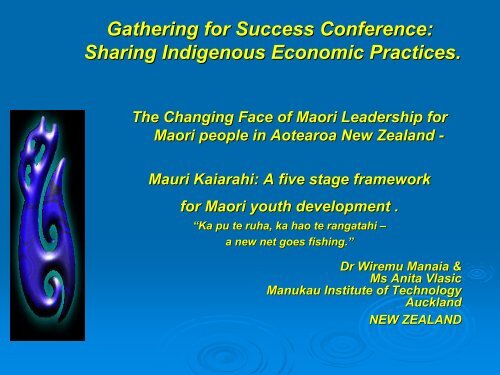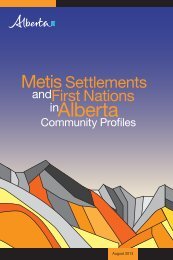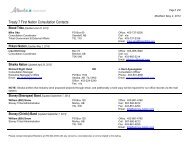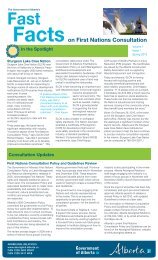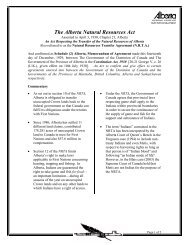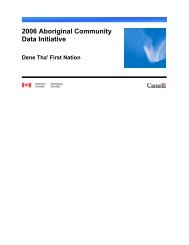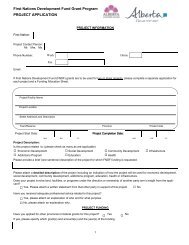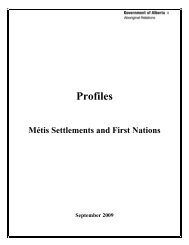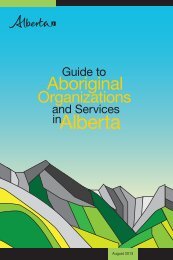Gathering for Success Conference: Sharing Indigenous Economic ...
Gathering for Success Conference: Sharing Indigenous Economic ...
Gathering for Success Conference: Sharing Indigenous Economic ...
- No tags were found...
You also want an ePaper? Increase the reach of your titles
YUMPU automatically turns print PDFs into web optimized ePapers that Google loves.
<strong>Gathering</strong> <strong>for</strong> <strong>Success</strong> <strong>Conference</strong>:<br />
<strong>Sharing</strong> <strong>Indigenous</strong> <strong>Economic</strong> Practices.<br />
The Changing Face of Maori Leadership <strong>for</strong><br />
Maori people in Aotearoa New Zealand -<br />
Mauri Kaiarahi: A five stage framework<br />
<strong>for</strong> Maori youth development .<br />
“Ka pu te ruha, ka hao te rangatahi –<br />
a new net goes fishing.”<br />
Dr Wiremu Manaia &<br />
Ms Anita Vlasic<br />
Manukau Institute of Technology<br />
Auckland<br />
NEW ZEALAND
Images of Aotearoa - New<br />
Zealand<br />
• http://www.youtube.com/watchv=eh-<br />
0knDpn5g&feature=related<br />
• http://www.youtube.com/watchv=9sEZwdFegU&feature=channel<br />
• http://www.youtube.com/watchv=TbWTqXl3_HA&featur<br />
e=channel
<strong>Gathering</strong> <strong>for</strong> <strong>Success</strong> <strong>Conference</strong>:<br />
<strong>Sharing</strong> <strong>Indigenous</strong> <strong>Economic</strong> Practices.<br />
The Changing Face of Maori Leadership <strong>for</strong><br />
Maori people in Aotearoa New Zealand -<br />
Mauri Kaiarahi: A five stage framework<br />
<strong>for</strong> Maori youth development .<br />
“Ka pu te ruha, ka hao te rangatahi –<br />
a new net goes fishing.”<br />
Dr Wiremu Manaia &<br />
Ms Anita Vlasic<br />
Manukau Institute of Technology<br />
Auckland<br />
NEW ZEALAND
Aotearoa - New Zealand<br />
• Island country in the South West<br />
Pacific comprised of 3 main land<br />
masses - North Island, South<br />
Island and Stewart Island.<br />
• 2000 kms south east of Australia<br />
• The last major landmass to be<br />
settled & colonised.<br />
• Became a colony on the 6 th of<br />
February 1840 with the signing of<br />
the Treaty of Waitangi between<br />
Queen Victoria of England and the<br />
Maori people of New Zealand.<br />
• Celebrated annually as Waitangi<br />
Day but it has a history of political<br />
unrest & controversy.
Population<br />
• Population<br />
of just under 4.3 million<br />
- 4,291,900. (Statistics New<br />
Zealand, December 2008)<br />
• The NZ population is mostly of<br />
Eurpopean descent with diverse<br />
mix of other ethnicities.<br />
• The indigenous Maori people are<br />
the largest minority.<br />
• Maori population just over 0.5<br />
million - 565,329.<br />
• Just under 40% are under the age<br />
of 15 years – 35.4%<br />
• Our largest resource are our youth.
Maori Identity<br />
“He<br />
kakano i ruia mai i a Rangiatea”<br />
I am a seed that is sown from my past!<br />
• What does this mean today<br />
• We are inextricably linked to our ancestry.<br />
• We must always remember who we are<br />
and where we come from.<br />
• A strong sense of identity is the key to<br />
secure future.<br />
• http://www.youtube.com<br />
www.youtube.com/watchv=3BoNmpvkavo&feature=relatedrelated
A Maori Renaisance.<br />
• Major Maori renaisance since the 1970s.<br />
• Settlement of claims <strong>for</strong> historical dispossession of tribal estates.<br />
• The management of MāoriM<br />
ori-owned owned assets.<br />
• A MāoriM<br />
ori-language education system<br />
• Maori industry initiatives i.e. fishing, aquaculture and farming.<br />
• Māori-owned owned enterprises in television, radio, businesses and<br />
tourist ventures.<br />
• Significant political representation<br />
• Maori individuals gaining international reputations <strong>for</strong> their<br />
achievements.<br />
• Māori people are now in a wide array of pursuits and activities<br />
throughout the world.
Maori Development<br />
and Maori Leadership.<br />
• Maori development based on integration<br />
• <strong>Economic</strong> self sufficiency, social equity,<br />
cultural affirmation and autonomy<br />
• Confident & skilled in te Ao Pakeha<br />
• Proud and proficient in te Ao Maori<br />
‘If Maori leaders of the future need to be<br />
visionaries what can be done now to assist,<br />
or accelerate this process’
Whakatutuki –<br />
Acknowledging <strong>Success</strong><br />
“Waiho ma te tangata e mihi – Let someone else sing<br />
your praises.”<br />
“He toa takitini taku toa, ehara i te toa takitahi – My<br />
bravery was the bravery of many, not just of one<br />
warrior.”<br />
“E E kore te kumara i whakapahu i tona reka - The<br />
kumara never tells how sweet it is.”
Whakatutuki: Acknowledging<br />
<strong>Success</strong> & Achievement.<br />
• Historically Maori are inclined to be humble in the<br />
midst of success.<br />
• Affected by colonisation.<br />
• Acknowledging success is difficult <strong>for</strong> many<br />
Maori.<br />
• The behaviour of celebrating success is an asset.<br />
• <strong>Success</strong> <strong>for</strong> one Maori is success <strong>for</strong> all Maori.<br />
• Celebration is an external influence <strong>for</strong><br />
developing Maori leadership.<br />
• The cognitive effect on the individual.<br />
• Enhanced self confidence & self motivation.
Whakamana:<br />
Earning Respect<br />
• Historically derived from whakapapa.<br />
• Individual skills, feats & achievements<br />
contributed to earning mana.<br />
• Mana was invested from collective<br />
wellbeing of the community.<br />
• Mana is derived from the people.<br />
• You gain mana from ef<strong>for</strong>ts that benefit<br />
the people.
Te Awe: Building<br />
Influence<br />
• Influence in te ao Maori & te ao Pakeha<br />
• Capture and inspire audiences<br />
• Three challenges Maori need to confront:<br />
1. The Crowns relationship with Maori<br />
2. Relationships between Maori<br />
3. A knowledge economy and a knowledge<br />
society<br />
• An economy based on knowledge<br />
• “Opportunity Creation Generation”<br />
• A knowledge economy takes generations<br />
• <strong>Success</strong> = Respect = Influence = Power =<br />
Responsibility
Kaha me te Kawe:<br />
Power and Responsibility<br />
“E E tipu e rea mo nga ra o tou ao; Ko to ringa ki nga rakau o<br />
te Pakeha hei oranga mo to Tinana; Ko to ngakau ki nga<br />
taonga a ou tipuna, hei tikitiki mo te mahunga, ko tou<br />
wairua ki te Atua nana nei nga mea katoa.” (Apirana<br />
Ngata - 1949)<br />
• Seek knowledge from te ao Pakeha & te ao Maori<br />
• Knowledge - Influence - Power + strong Maori<br />
identity<br />
• Maori leaders must know how to manage influence,<br />
power and responsibility<br />
• Mauri Kaiarahi is applicable to all Maori<br />
• All Maori have a role through parenting
Mauri Kaiarahi:<br />
Maori Leadership Values<br />
• A personal leadership development cycle<br />
1. Whakatutuki: <strong>Success</strong><br />
2. Whakamana: Respect<br />
3. Te Awe Turanga: Influence<br />
4. Kaha: Power<br />
5. Kawe: Responsibility<br />
• Future Maori leaders must look beyond<br />
immediate personal needs and visualise<br />
the benefit of their actions on all Maori
Mauri Kaiarahi:<br />
Maori Leadership Values<br />
Te Ao Maori<br />
1.<br />
Whakatutuki:<br />
<strong>Success</strong><br />
4.<br />
Te Awe:<br />
Influence<br />
5. Kawe: Responsibility<br />
2.<br />
Whakamana:<br />
Respect<br />
3.<br />
Kaha:<br />
Power<br />
Te Ao Pakeha
Future Maori Health Issues<br />
& Developments<br />
How do we develop Maori<br />
leaders <strong>for</strong> the future<br />
&<br />
What issues and developments<br />
are they likely to face
A&D & other substance<br />
Addictions<br />
• Still an increasing prevalence i.e. Meths.<br />
• Expanding variety & diversity i.e. problem<br />
gambling, status anxiety, stress.<br />
• Dual economic attraction.<br />
• Easier access, availability & af<strong>for</strong>dability.<br />
• Complexity and severity.<br />
• Growing & accelerated negative impact.<br />
• Deficient treatment strategies i.e. generic<br />
mental health issue.<br />
• Major work<strong>for</strong>ce development issue.<br />
• Influecnes of genetic predisposition
Nutrition<br />
• Increasing evidence of generational behaviour.<br />
• Decades of high fat content diets & repetitive<br />
unhealthy behaviour.<br />
• Incidence rates <strong>for</strong> co-related health issues i.e.<br />
coronary heart disease & diabetes.<br />
• Changing Maori lifestyles.<br />
• Rapidly growing and expanding competitive fast food<br />
industry.<br />
• Changing attitudes to physical activity & behaviour.<br />
• Cost issues <strong>for</strong> low socio economic communities.<br />
• Evolving food manufacturing issues.<br />
• Emerging obesity epidemic.<br />
• New emerging stress disorders with dieting issues.
Mental Health Trauma &<br />
Counseling<br />
• Increasing risks of mental health trauma in<br />
society i.e. child abuse & mortalitiy.<br />
• Improved chances of identifying needs.<br />
• Changing attitudes to mental health trauma<br />
treatment.<br />
• Recovery focus <strong>for</strong> mental health sector<br />
treatment.<br />
• Growing wealth of Maori mental health<br />
research.<br />
• Increasing Maori community awareness.<br />
• Maori mental health work<strong>for</strong>ce deficiency.
Parenting<br />
• Influential attributes of urban Maori living.<br />
• Changing whanau structures.<br />
• Maori adolescent employment.<br />
• Growing independence of Maori youth.<br />
• Kohanga Reo & Kura Kaupapa generation.<br />
• Growing number of Maori in tertiary<br />
education.<br />
• Rapidly evolving society <strong>for</strong> modern day<br />
parents.<br />
• Divergent Maori generations.
Maori Identity<br />
• Outcomes from Kohanga Reo, Kura<br />
Kaupapa Maori, Wananga, scholarships.<br />
• Aging Maori Population.<br />
• Maori socio economic status.<br />
• Older Maori parent generation.<br />
• Decreasing size of average Maori whanau.<br />
• Maori adaptation to societal change.<br />
• Increasing exposure, diversity & attraction<br />
of other value systems i.e commercialisation<br />
& globalisation.
Mauri Kaiarahi: Maori<br />
Leadership Values<br />
“A A man with no history, has no future.”<br />
Nelson Mandela (1990)<br />
• This is how focussed future Maori leaders<br />
must be<br />
• Visionaries with a focus on responsibilities<br />
• Never <strong>for</strong>get who you are and where you<br />
come from<br />
• Start with the end in mind<br />
• Focus on responsibilities now!
<strong>Gathering</strong> <strong>for</strong> <strong>Success</strong> <strong>Conference</strong>:<br />
<strong>Sharing</strong> <strong>Indigenous</strong> <strong>Economic</strong> Practices.<br />
The Changing Face of Maori Leadership <strong>for</strong><br />
Maori people in Aotearoa New Zealand -<br />
Mauri Kaiarahi: A five stage framework<br />
<strong>for</strong> Maori youth development .<br />
“Ka pu te ruha, ka hao te rangatahi –<br />
a new net goes fishing.”<br />
Dr Wiremu Manaia &<br />
Ms Anita Vlasic<br />
Manukau Institute of Technology<br />
Auckland<br />
NEW ZEALAND


